Report from Dr Wells
Dr Wells and her Research Associate Dr Michaela Lesjak, this year’s Secondary1st Researcher, are dedicated to unravelling the complex cellular process that drives breast cancer to spread. They want to identify the interactions happening inside cancer cells that promote their ability to move and invade other tissues. This means they are interested in finding the…

